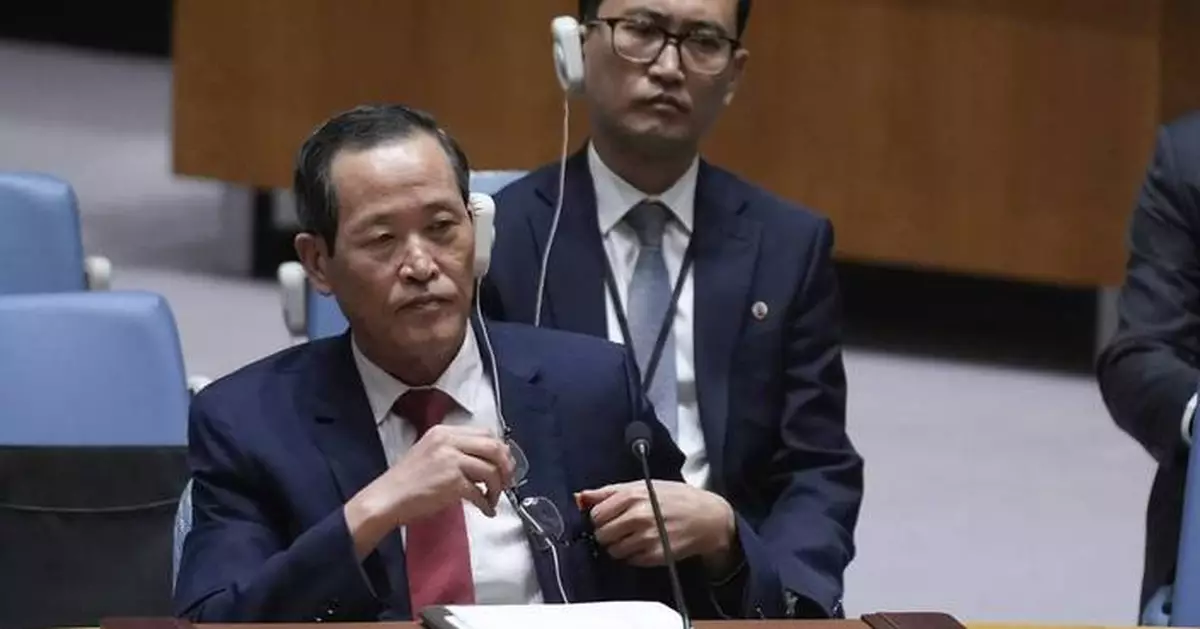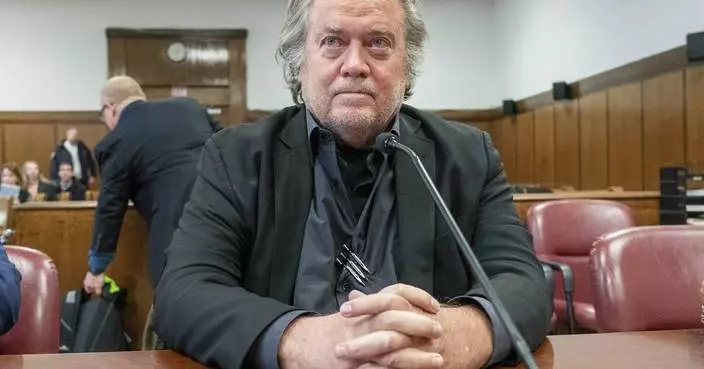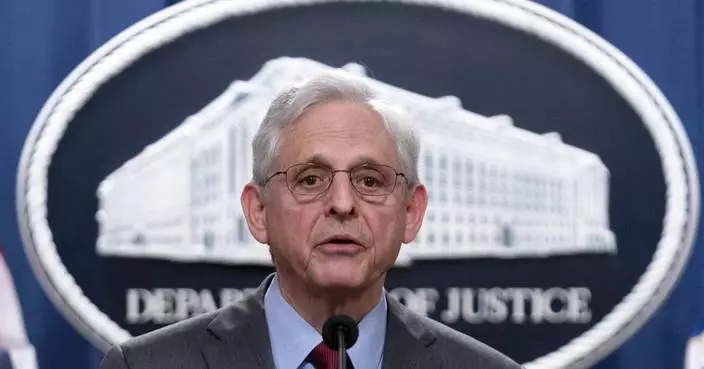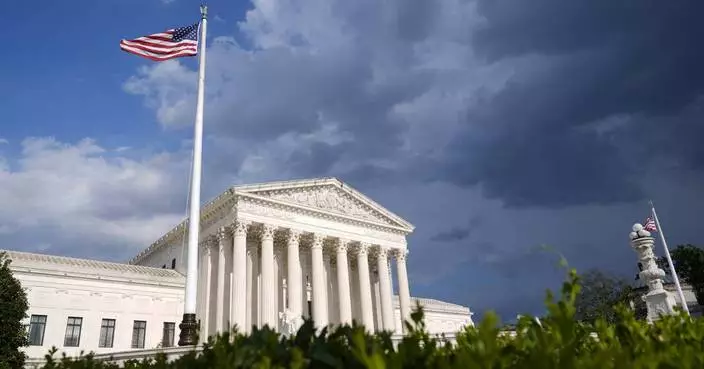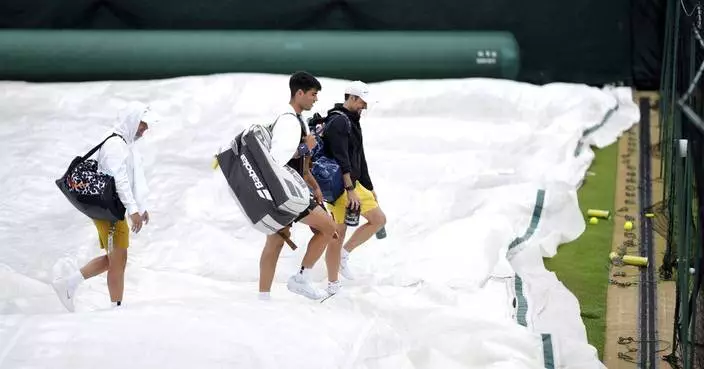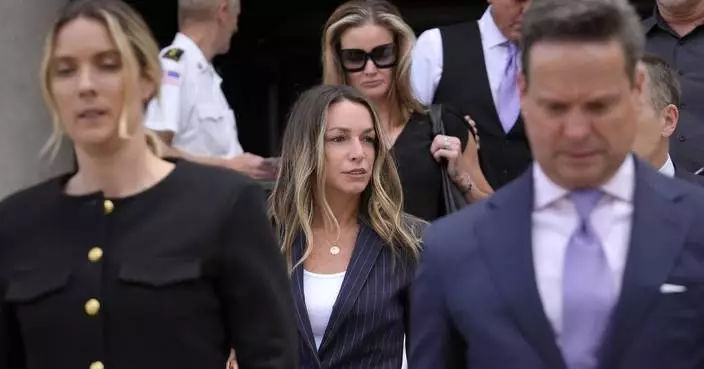UNITED NATIONS (AP) — The head of a research organization that has been tracing weapons used in attacks in Ukraine since 2018 told the United Nations Security Council on Friday it has “irrefutably” established that ballistic missile remnants found in Ukraine came from North Korea.
The United States and its Western allies clashed with Russia and North Korea at the meeting, saying both countries violated a U.N. embargo on arms exports from the Democratic People’s Republic of Korea, the country’s official name. Russia dismissed the “baseless accusations,” and the DPRK dismissed the meeting as “an extremely brazen act” to discuss “someone’s alleged 'weapon transfers.’”
Click to Gallery
UNITED NATIONS (AP) — The head of a research organization that has been tracing weapons used in attacks in Ukraine since 2018 told the United Nations Security Council on Friday it has “irrefutably” established that ballistic missile remnants found in Ukraine came from North Korea.
North Korean ambassador to the United Natiopns Song Kim speaks during a Security Council meeting at United Nations headquarters, Friday, June 28, 2024. (AP Photo/Seth Wenig)
The European Union's ambassador to the United Nations Stavros Lambrinidis speaks during a Security Council meeting at United Nations headquarters, Friday, June 28, 2024. (AP Photo/Seth Wenig)
Russian ambassador to the United Nations Vassily Nebenzia listens to speakers during a Security Council meeting at United Nations headquarters, Friday, June 28, 2024. (AP Photo/Seth Wenig)
United States deputy ambassador Robert Wood speaks during a Security Council meeting at United Nations headquarters, Friday, June 28, 2024. (AP Photo/Seth Wenig)
Chinese deputy ambassador to the United Nations Geng Shuang, right, shakes hands with North Korean ambassador to the UN Song Kim at the end of a Security Council meeting at United Nations headquarters, Friday, June 28, 2024. (AP Photo/Seth Wenig)
North Korean ambassador to the United Natiopns Song Kim finishes speaking during a Security Council meeting at United Nations headquarters, Friday, June 28, 2024. (AP Photo/Seth Wenig)
Jonah Leff, executive director of Conflict Armament Research, gave the council a detailed analysis of the remnants of the missile that struck Ukraine’s second-largest city, Kharkiv, on Jan. 2.
He said the organization documented the missile’s rocket motor, its tail section and almost 300 components manufactured by 26 companies from eight countries and territories, and it determined the missile was either a KN-23 or KN-24 manufactured in 2023 in the DPRK.
The organization reached its conclusion based on the missile’s unique characteristics — its diameter, distinct jet vane actuators that direct the missile’s thrust and trajectory, the pattern around the igniter, the presence of Korean characters on some rocket components, and other marks and components dating back to 2023, he said.
“Following the initial documentation, our teams inspected three additional identical DPRK missiles that struck Kyiv and Zaporizhzhia earlier this year,” Leff said. They also observed additional conventional weapons, including an artillery rocket produced in 1977, “that had been seized on the front lines and had not been observed on the battlefield previously in Ukraine” that were manufactured by the DPRK, and might have been part of a recent larger consignment of rockets.
The council discussed illegal arms transfers from North Korea at the request of France, Japan, South Korea, the United Kingdom and the United States.
The meeting followed Russia’s March 28 veto that ended the monitoring of sanctions against North Korea over its expanding nuclear program by a U.N. panel of experts. The U.S. and its European and Asian allies accused Moscow of seeking to avoid scrutiny as it allegedly violates sanctions to buy weapons from Pyongyang for its war in Ukraine.
U.N. disarmament chief Izumi Nakamitsu told the council Friday that before its mandate expired, the panel of experts was reviewing a report from Ukraine on missile debris it recovered “following information about short-range ballistic missiles manufactured in the DPRK and used by Russian armed forces in Ukraine.”
While the mandate of the experts, which had been extended since 2009 with Russia’s support, was terminated, Nakamitsu said “it is important to note” that the Security Council committee responsible for monitoring the implementation of sanctions against the DPRK “continues its work and will oversee the implementation of the sanctions regime.”
U.S. deputy ambassador Robert Wood called Leff’s presentation with its many technical details “quite compelling,” and told the council that while Russia may have ended the panel’s monitoring with China’s “tacit support,” the briefing showed that Moscow and Beijing “cannot prevent the public from learning about the unlawful arms transfers occurring between the DPRK and Russia.”
He said the independent findings by Leff’s research organization corroborate open-source reports and analyses. And he said that, in addition to the dozens of missiles Russia has transferred from the DPRK, it has also unlawfully transferred over 11,000 containers of munitions.
“As a permanent member of the Security Council, Russia has a responsibility to uphold and strengthen international peace and security,” Wood said. “Yet, Russia is launching ballistic missiles, which it unlawfully procured from the DPRK, against the Ukrainian people.”
Russian Ambassador Vassily Nebenzia accused the meeting's Western sponsors of attempting to use the Security Council “to trot out an anti-Russian and anti-North Korean narrative and to disseminate baseless accusations in order to detract attention from their own destructive actions which foment escalation in the region.”
He called the claims that Russia is using DPRK missiles in Ukraine “absolutely false,” questioning the professionalism and expertise of those who examined the wreckage in Ukraine.
Nebenzia accused the United States of constantly stepping up the militarization of the Asia-Pacific region and said Washington’s policy of “extended deterrence” on Russia’s eastern border “poses a real threat not just for the DPRK but also for our country.”
He said the purpose of the June 19 strategic partnership agreement signed by Russian President Vladimir Putin and North Korean leader Kim Jong Un “is to play a stabilizing role in northeast Asia amidst an unprecedented escalation of tensions.” As for Article 4 of the agreement, providing for the delivery of mutual military assistance if either country is subject to an armed attack, he said this should not arouse “national security-related concerns” for countries that don’t plan to attack the DPRK.
North Korean Ambassador Kim Song called the United States “the world’s biggest arms exporter,” and accused the Western countries that called the council meeting of being “the main culprits” of disturbing global peace. They have caused “tragic bloodshed by extensive shipment of weapons " and have cast “a cloud of war in every corner of the world.”
Song detailed U.S. arms shipments to South Korea and Japan and accused the U.S. and its followers of trying to obstruct the development of DPRK-Russia relations. He defended those relations as “completely of a peace-loving and defensive nature.”
China's deputy U.N. ambassador, Geng Shuang, warned that peace and security in all of northeast Asia will be affected if there is “more chaos” on the Korean peninsula.
He called on all parties to be “rational and pragmatic” and “work together to cool down the situation.”
China will play “a constructive role” to realize long-term peace and stability on the Korean peninsula, Geng said, and he called on the United States to end its pressure campaign against the DPRK and “the myth of deterrence,” and demonstrate its sincerity in holding an unconditional dialogue “through concrete action.”
U.S. envoy Wood retorted: “If, indeed, China is so concerned about the security situation on the Korean peninsula, then it needs to use its influence with the DPRK to persuade it from undermining regional and global security.”
“It should also use its influence that it has with Russia through its new 'No Limits’ partnership to end this increasingly dangerous military cooperation between DPRK and Russia,” he said.
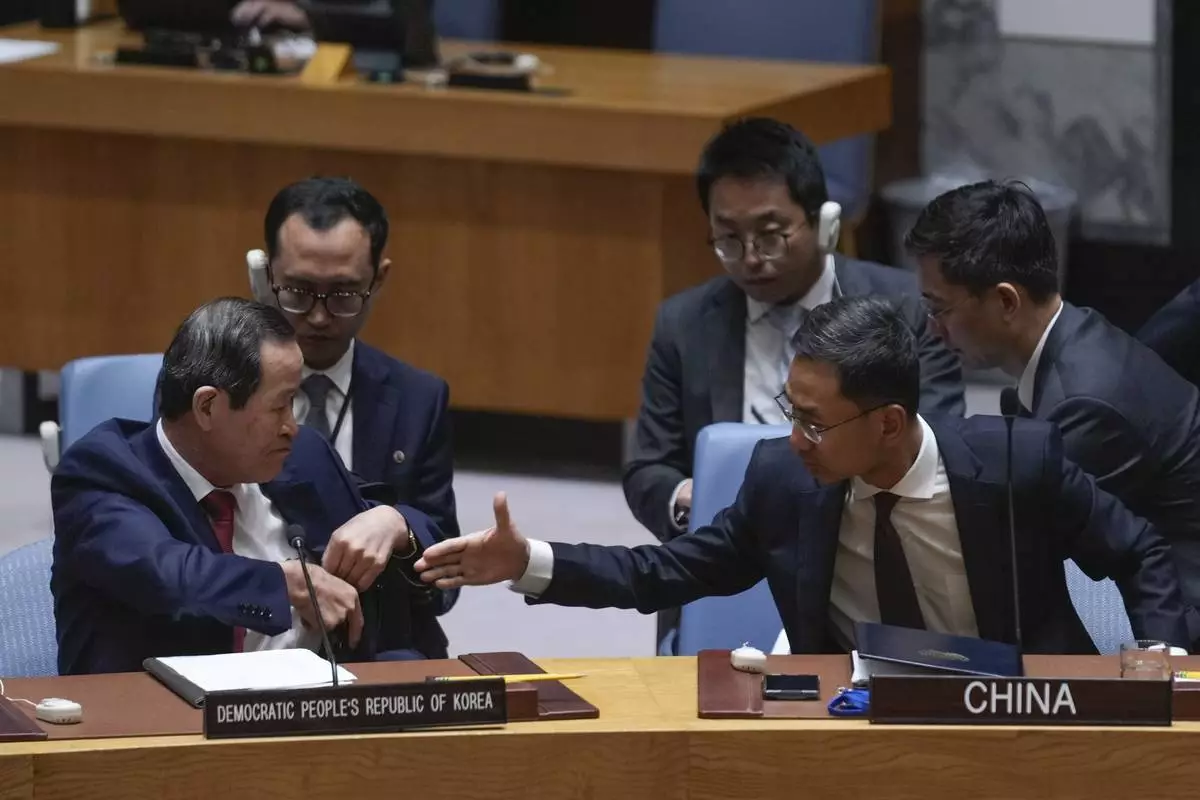
Chinese deputy ambassador to the United Nations Geng Shuang, right, offers his hand to North Korean ambassador to the UN Song Kim at the end of a Security Council meeting at United Nations headquarters, Friday, June 28, 2024. (AP Photo/Seth Wenig)
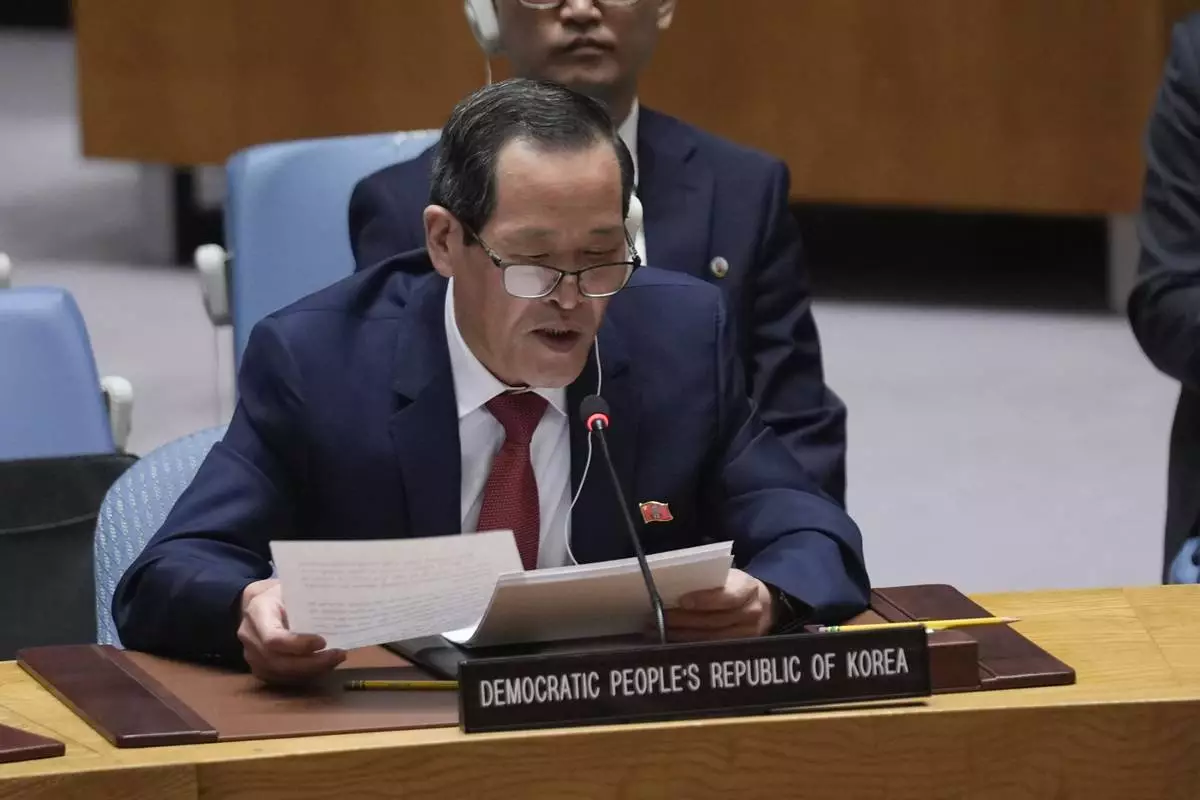
North Korean ambassador to the United Natiopns Song Kim speaks during a Security Council meeting at United Nations headquarters, Friday, June 28, 2024. (AP Photo/Seth Wenig)
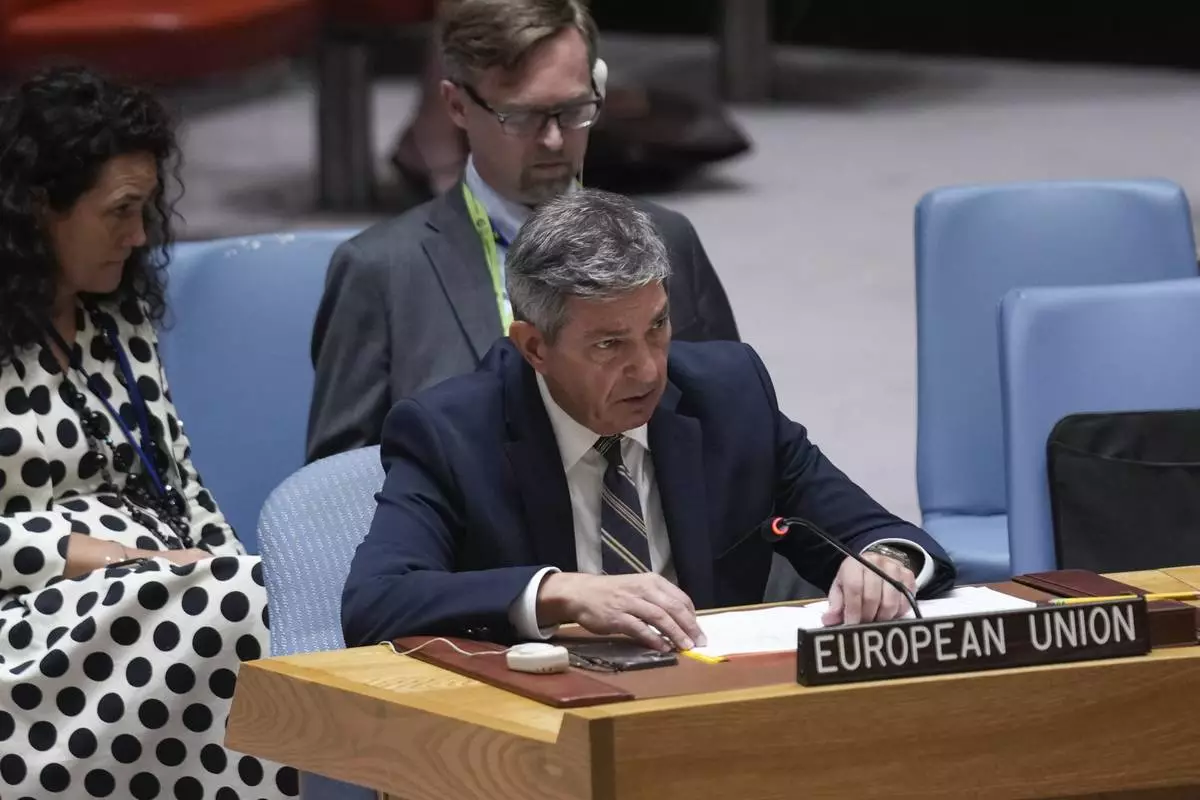
The European Union's ambassador to the United Nations Stavros Lambrinidis speaks during a Security Council meeting at United Nations headquarters, Friday, June 28, 2024. (AP Photo/Seth Wenig)
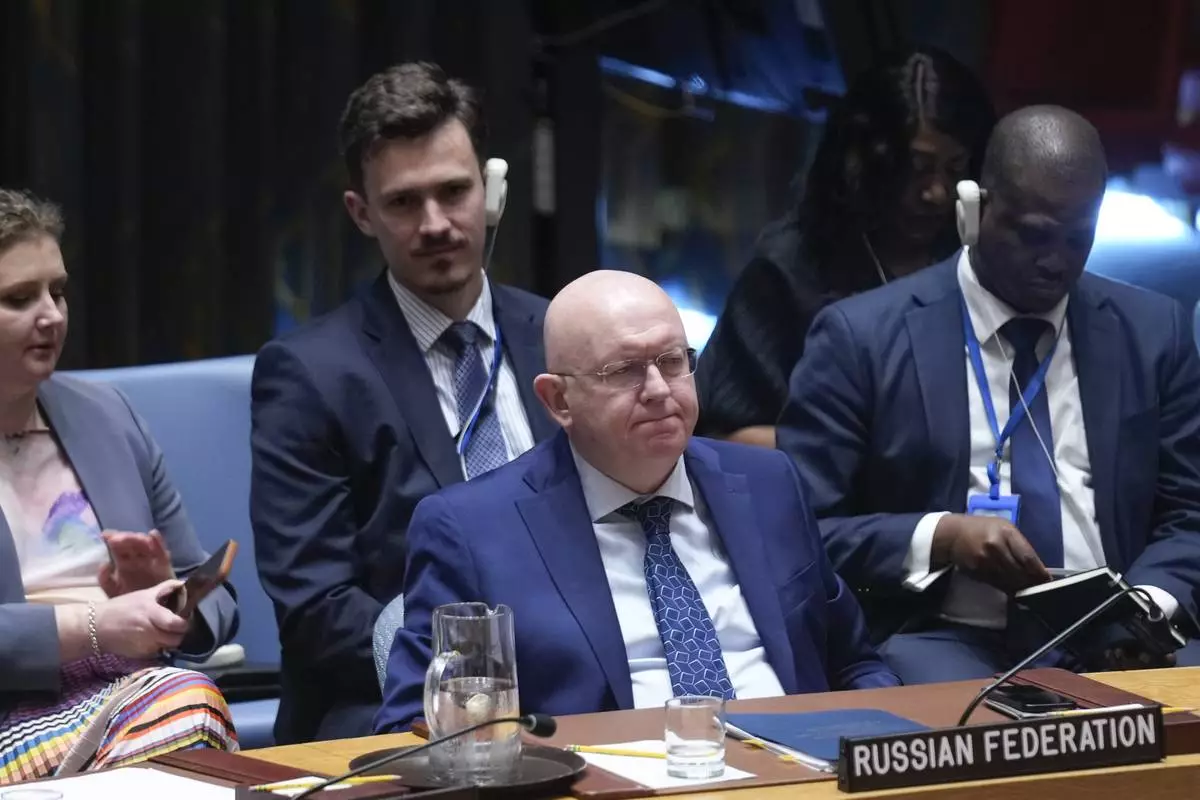
Russian ambassador to the United Nations Vassily Nebenzia listens to speakers during a Security Council meeting at United Nations headquarters, Friday, June 28, 2024. (AP Photo/Seth Wenig)
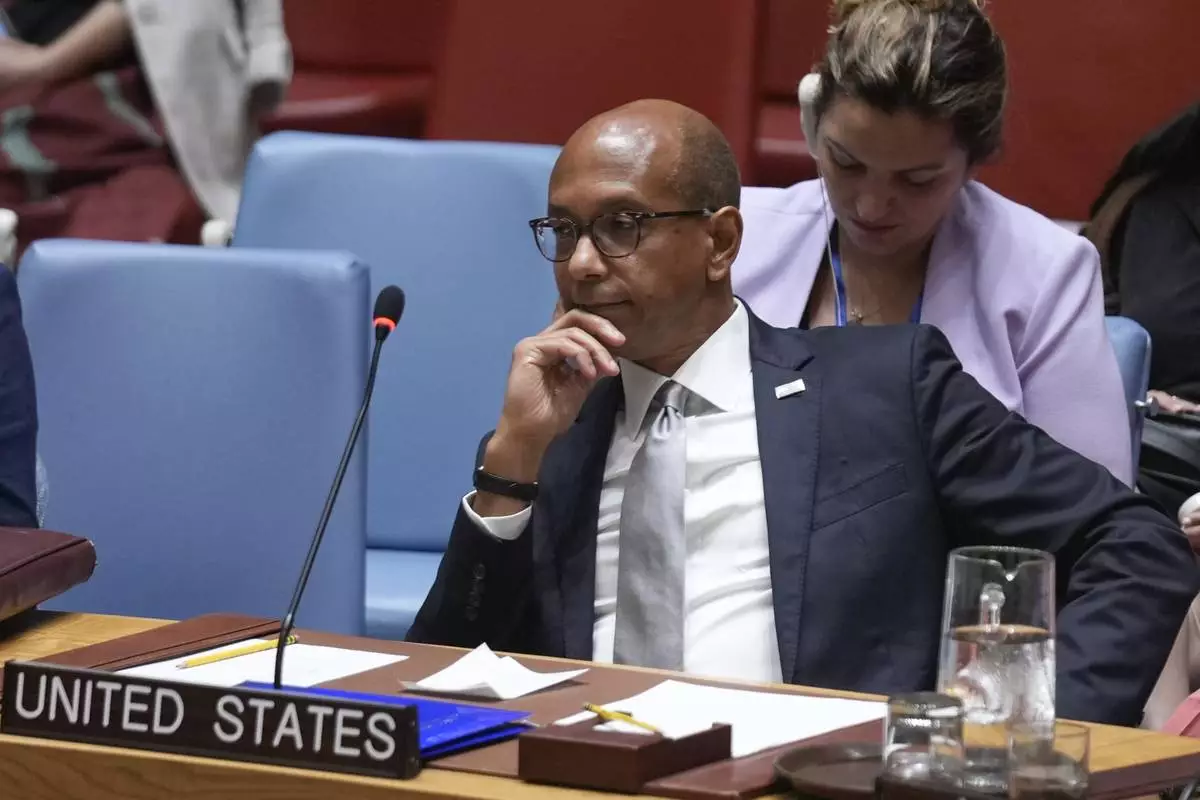
United States deputy ambassador Robert Wood speaks during a Security Council meeting at United Nations headquarters, Friday, June 28, 2024. (AP Photo/Seth Wenig)
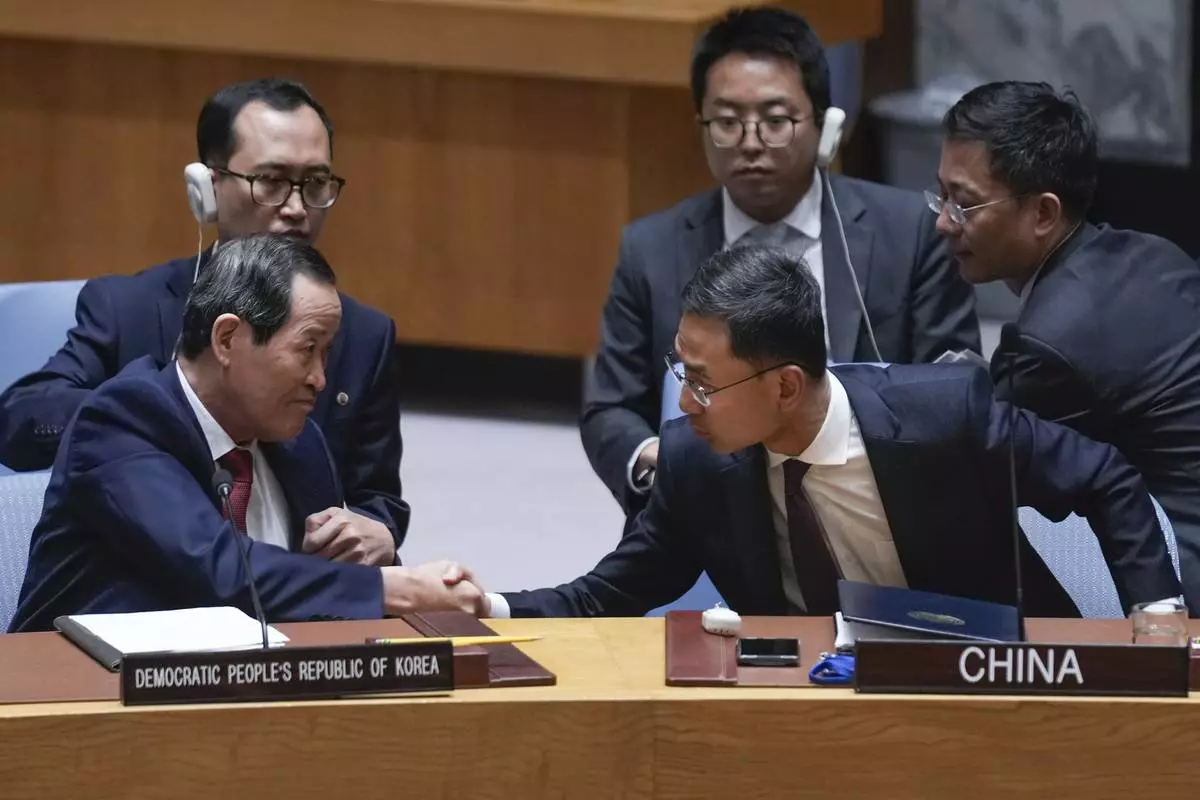
Chinese deputy ambassador to the United Nations Geng Shuang, right, shakes hands with North Korean ambassador to the UN Song Kim at the end of a Security Council meeting at United Nations headquarters, Friday, June 28, 2024. (AP Photo/Seth Wenig)
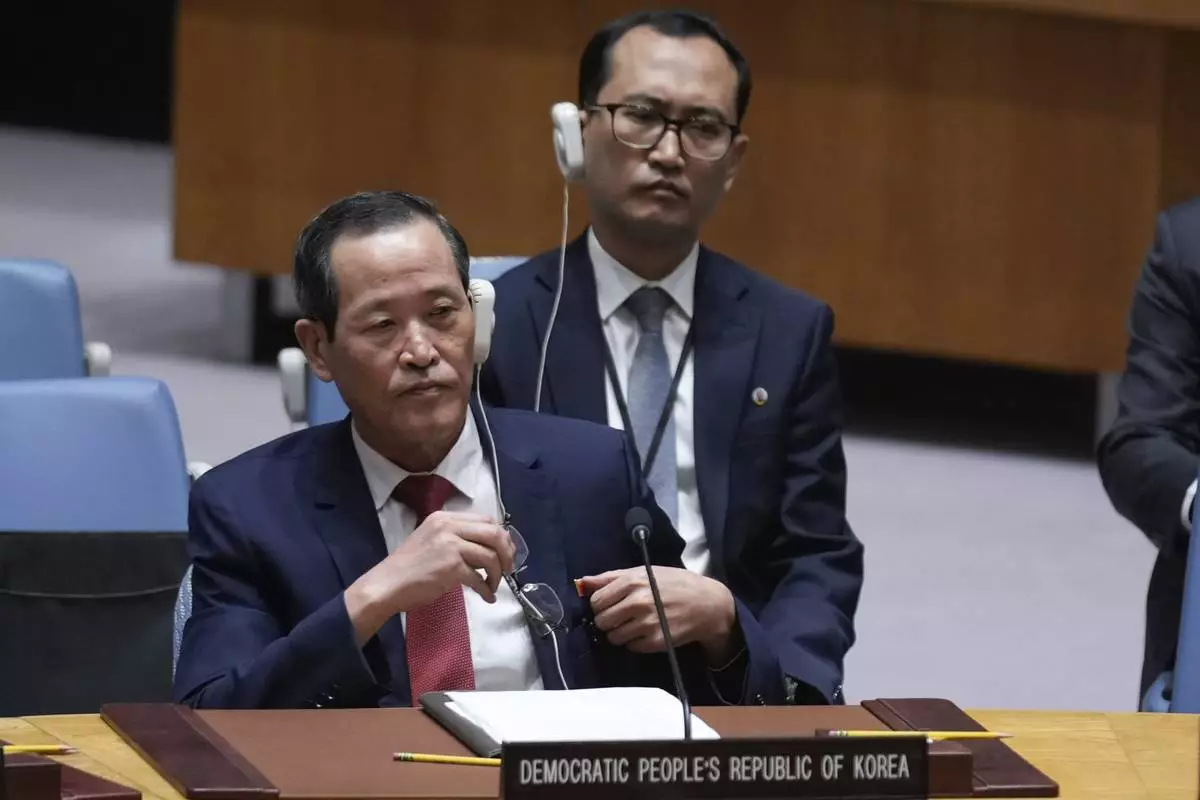
North Korean ambassador to the United Natiopns Song Kim finishes speaking during a Security Council meeting at United Nations headquarters, Friday, June 28, 2024. (AP Photo/Seth Wenig)
KHAN YOUNIS, Gaza Strip (AP) — The Israeli army ordered a mass evacuation of Palestinians from much of Khan Younis on Monday, a sign that troops are likely to launch a new ground assault in the Gaza Strip's second largest city.
The order suggested Khan Younis will be the latest of Israel's repeated raids into parts of Gaza it has already invaded over the past eight months, pursuing Hamas militants as they regroup. Much of Khan Younis was already destroyed in a long assault earlier this year, but large numbers of Palestinians have since moved back in to escape another Israeli offensive in Gaza's southern-most city, Rafah.
The evacuation call covered the entire eastern half of Khan Younis and surrounding areas. Last week, the military ordered a similar evacuation from the north Gaza district of Shujaiya, where there has been intensive fighting since.
The order came as Israel released the director of Gaza’s main hospital after holding him for seven months without charge or trial over allegations the facility had been used as a Hamas command center. He said he and other detainees were held under harsh conditions and tortured.
The decision to release Mohammed Abu Selmia raised questions over Israel’s claims surrounding Shifa Hospital, which Israeli forces have raided twice since the start of the nearly nine-month war with Hamas. Abu Selmia and other Palestinian health officials have denied the accusations.
His release triggered an uproar across Israel’s political spectrum. Government ministers and opposition leaders expressed outrage and insisted Abu Salmia played a role in Hamas’ alleged use of the hospital — though Israeli security services rarely unilaterally free prisoners if they have a suspicion of militant links.
The decision appeared to have been taken to free up space in overcrowded detention centers. Prime Minister Benjamin Netanyahu ordered an inquiry, his office said, though it added that security officials independently determine whom to release “based on their professional considerations.”
Abu Selmia was released back into Gaza along with 54 other Palestinian detainees, many of whom also alleged abuse. The allegations could not be independently confirmed but matched other accounts of Palestinians who have been held in Israeli custody.
“Our detainees have been subjected to all kinds of torture behind bars,” Abu Selmia said at a news conference after his release. “There was almost daily torture.” He said guards broke his finger and caused his head to bleed during beatings, in which they used batons and dogs.
He said the medical staff at different facilities where he was held had also taken part in the abuse “in violation of all laws.” He said some detainees had limbs amputated because of poor medical care.
There was no immediate response from the prison service, which has previously denied similar accusations.
Israeli forces raided Shifa Hospital in November, alleging that Hamas had created an elaborate command and control center inside the facility. Abu Selmia and other staff denied the allegations and accused Israel of recklessly endangering thousands of patients and displaced people who were sheltering there.
The military uncovered a tunnel beneath Shifa Hospital leading to a few rooms, as well as other evidence that militants had been present inside the medical center, but the evidence fell short of what it had claimed before the raid.
Abu Selmia was detained on Nov. 22 while escorting a U.N.-led evacuation of patients from the hospital. He said his detention was “politically motivated,” adding that he had been brought to court at least three times but was never charged or allowed to meet with lawyers.
Israel has since raided other Gaza hospitals on similar allegations, forcing them to shut down or dramatically reduce services even as tens of thousands have been wounded in Israeli strikes or sickened in the harsh conditions of the war. The army raided Shifa a second time earlier this year, causing heavy destruction after saying that militants had regrouped there.
Hospitals can lose their protection under international law if combatants use them for military purposes, but any assaults on them must still be proportional to any military threat.
Amid the uproar over Abu Selmia’s release, the various Israeli state organs responsible for detentions scrambled to shift blame.
Itamar Ben Gvir, Israel’s far-right national security minister who controls the country’s police and prison service, said the releases constituted “security negligence” and blamed the Defense Ministry. Opposition leader Yair Lapid said Abu Selmia’s release was another sign of the government’s “lawlessness and dysfunction.”
Defense Minister Yoav Gallant’s office said the incarceration and release of prisoners is the responsibility of the prison service and the Shin Bet internal security agency. The prison service said the decision was made by the Shin Bet and the army, and released a document ordering his release that was signed by an army reserve general.
The Shin Bet said Abu Selmia had passed a risk assessment, “compared to other detainees.” It said the government had decided against its advice to release detainees determined to be less of a threat in order to free up space.
Since the start of the war, Israeli forces have detained thousands of Palestinians from Gaza and the occupied West Bank, crowding military detention facilities and prisons. Many are being held without charge or trial in what is known as administrative detention.
Israel launched its offensive after Hamas’ Oct. 7 attack, in which Palestinian militants killed some 1,200 civilians and took another 250 hostage. In its campaign, Israel has killed at least 37,900 Palestinians, according to Gaza’s Health Ministry, which does not say how many were civilians or fighters.
Most of Gaza’s population of 2.3 million have fled their homes, with many displaced multiple times. Israeli restrictions, ongoing fighting and the breakdown of public order have hindered the delivery of humanitarian aid, fueling widespread hunger and sparking fears of famine.
Magdy reported from Cairo and Frankel from Jerusalem.
Follow AP’s coverage of the war in Gaza at https://apnews.com/hub/israel-hamas-war
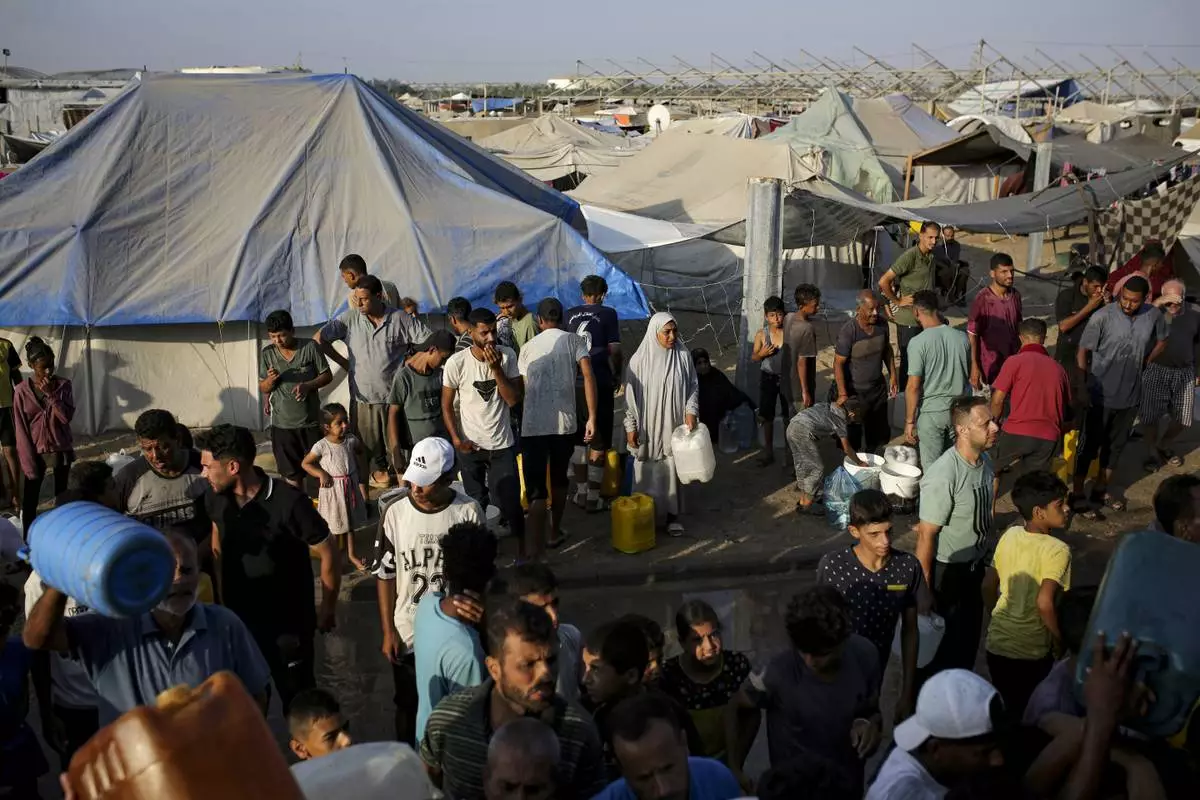
Palestinians displaced by the Israeli bombardment of the Gaza Strip queue for water at a makeshift tent camp in the southern town of Khan Younis, Monday, July 1, 2024. (AP Photo/Jehad Alshrafi)
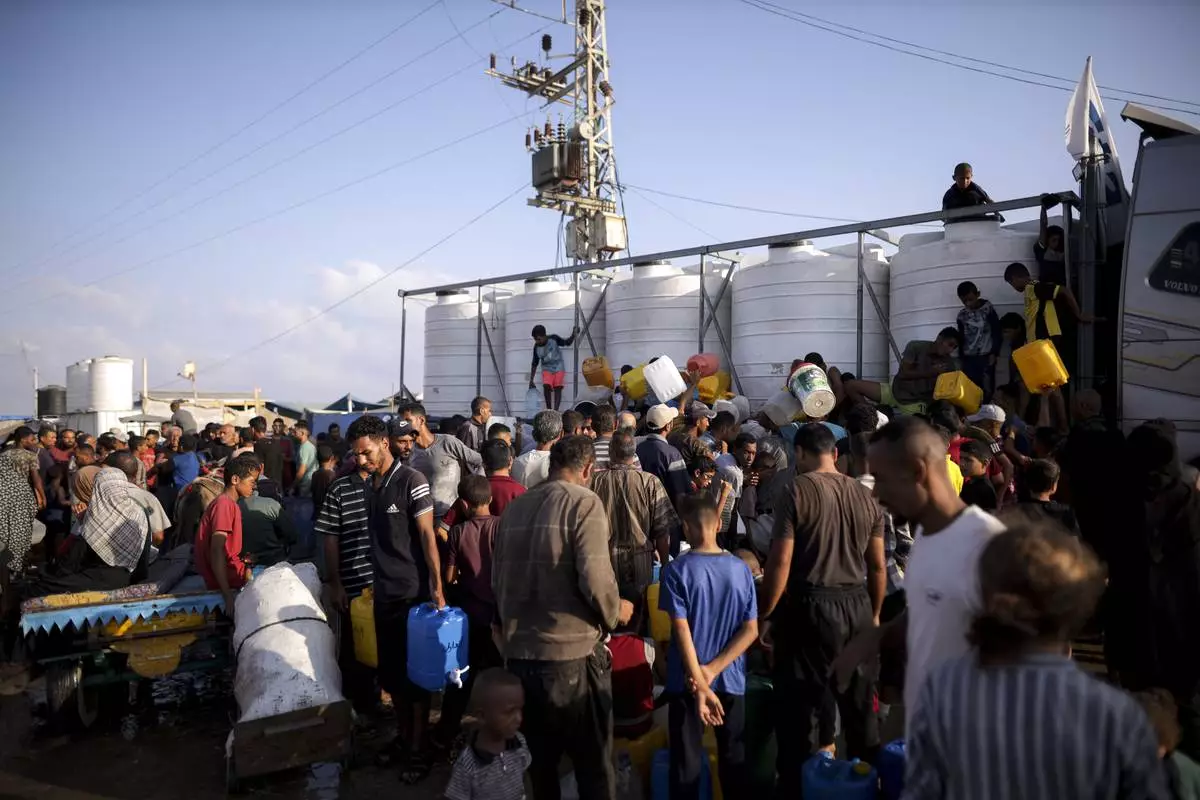
Palestinians displaced by the Israeli bombardment of the Gaza Strip queue for water at a makeshift tent camp in the southern town of Khan Younis, Monday, July 1, 2024. (AP Photo/Jehad Alshrafi)
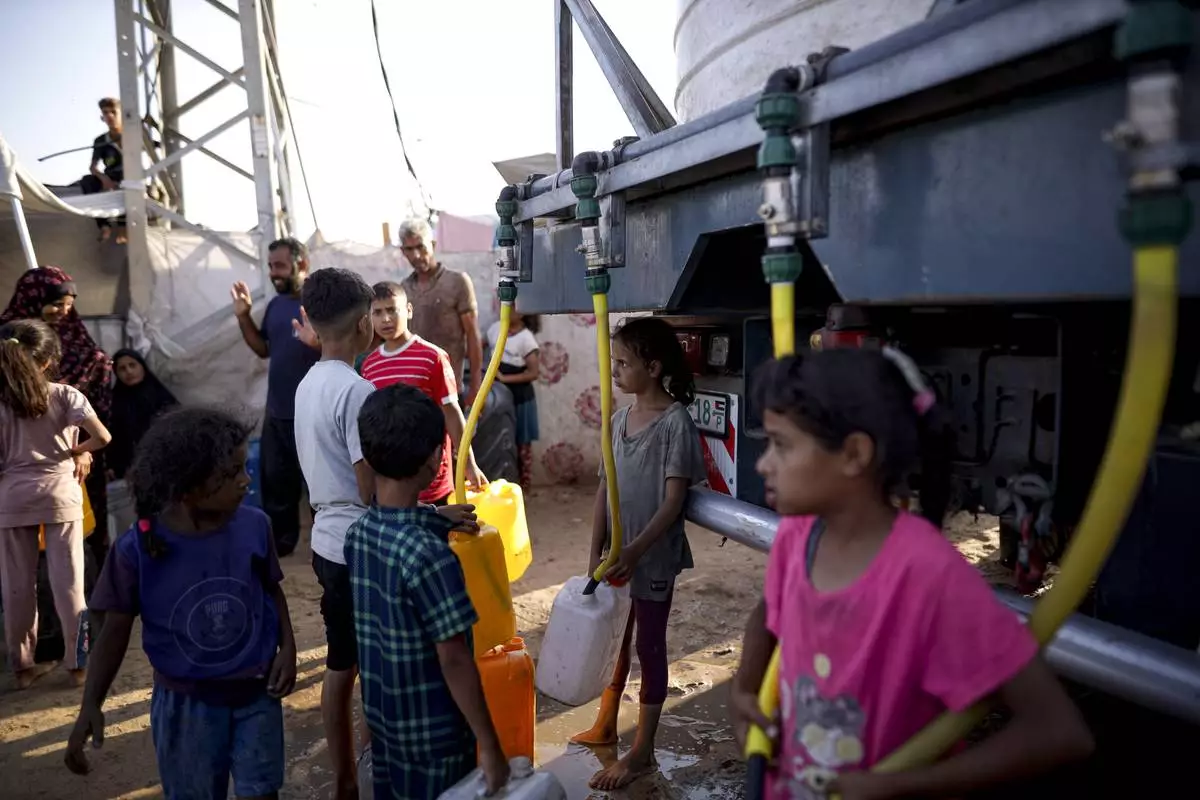
Palestinian children displaced by the Israeli bombardment of the Gaza Strip fill plastic bottles with water as others queue and wait their turn at a makeshift tent camp in the southern town of Khan Younis, Monday, July 1, 2024. (AP Photo/Jehad Alshrafi)
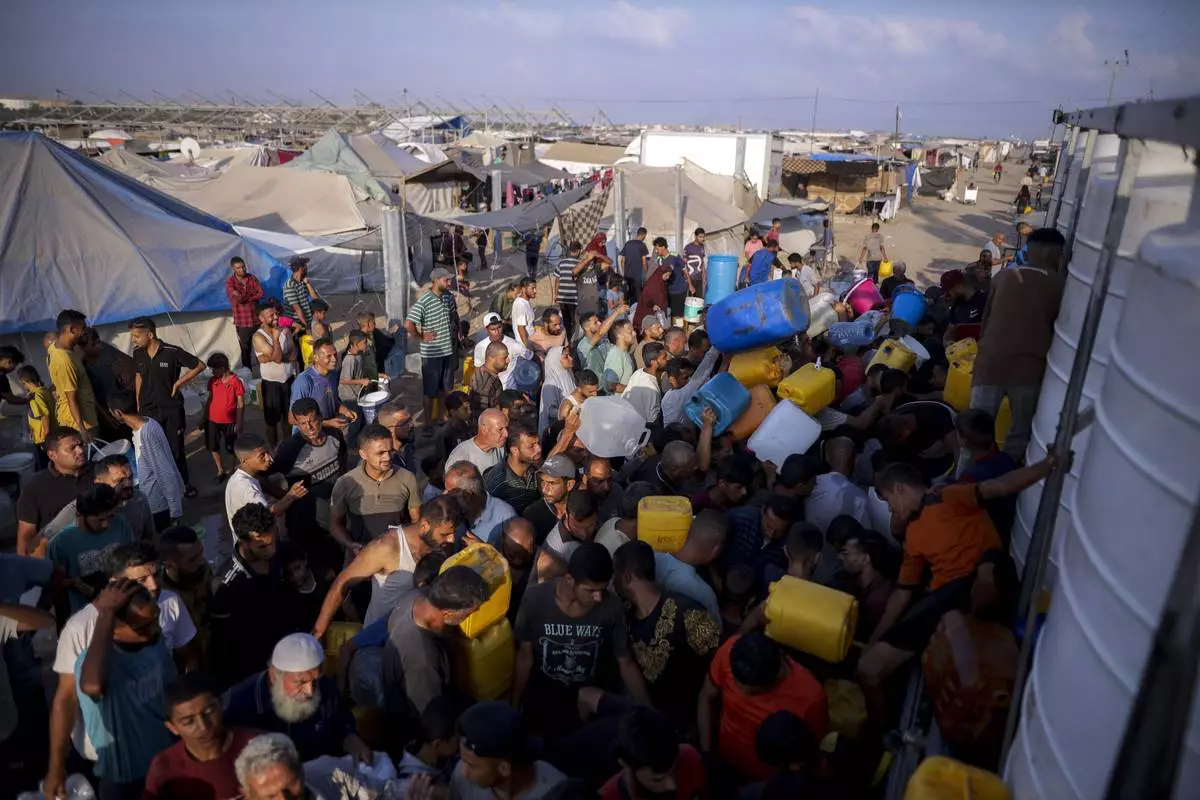
Palestinians displaced by the Israeli bombardment of the Gaza Strip queue for water at a makeshift tent camp in the southern town of Khan Younis, Monday, July 1, 2024. (AP Photo/Jehad Alshrafi)
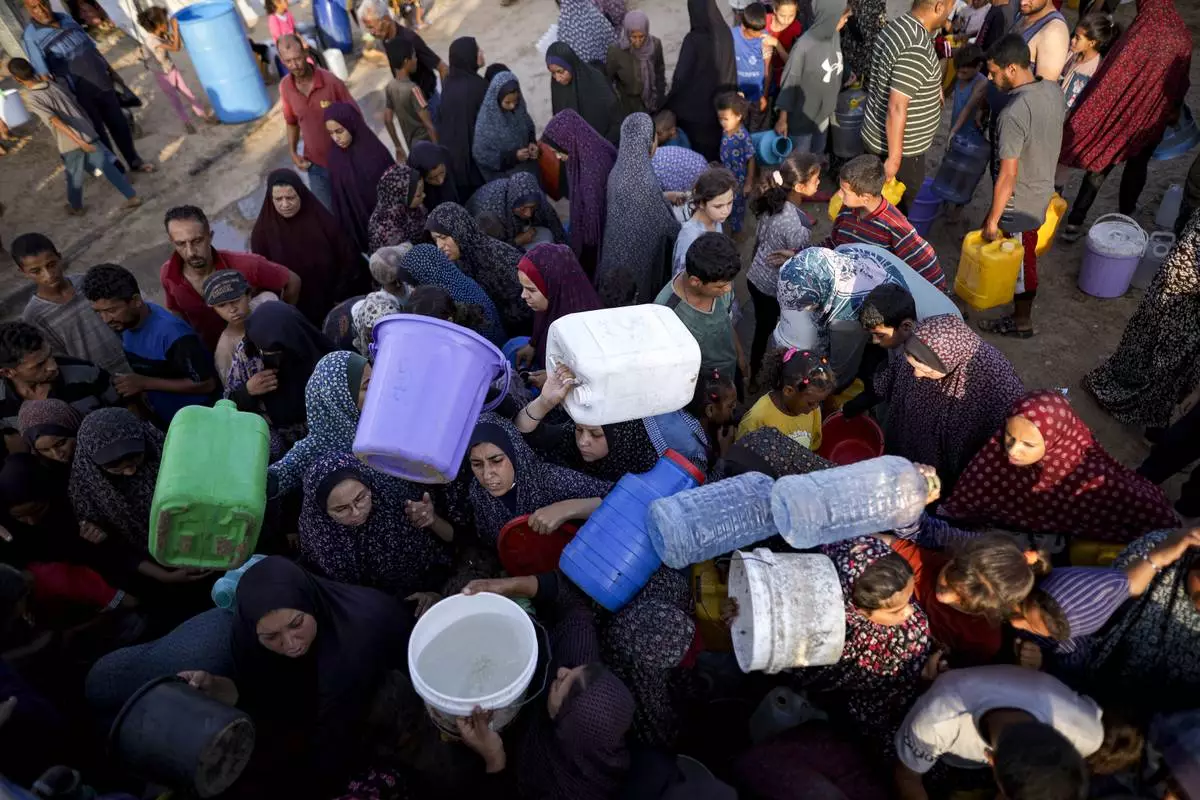
Palestinians displaced by the Israeli bombardment of the Gaza Strip queue for water at a makeshift tent camp in the southern town of Khan Younis, Monday, July 1, 2024. (AP Photo/Jehad Alshrafi)
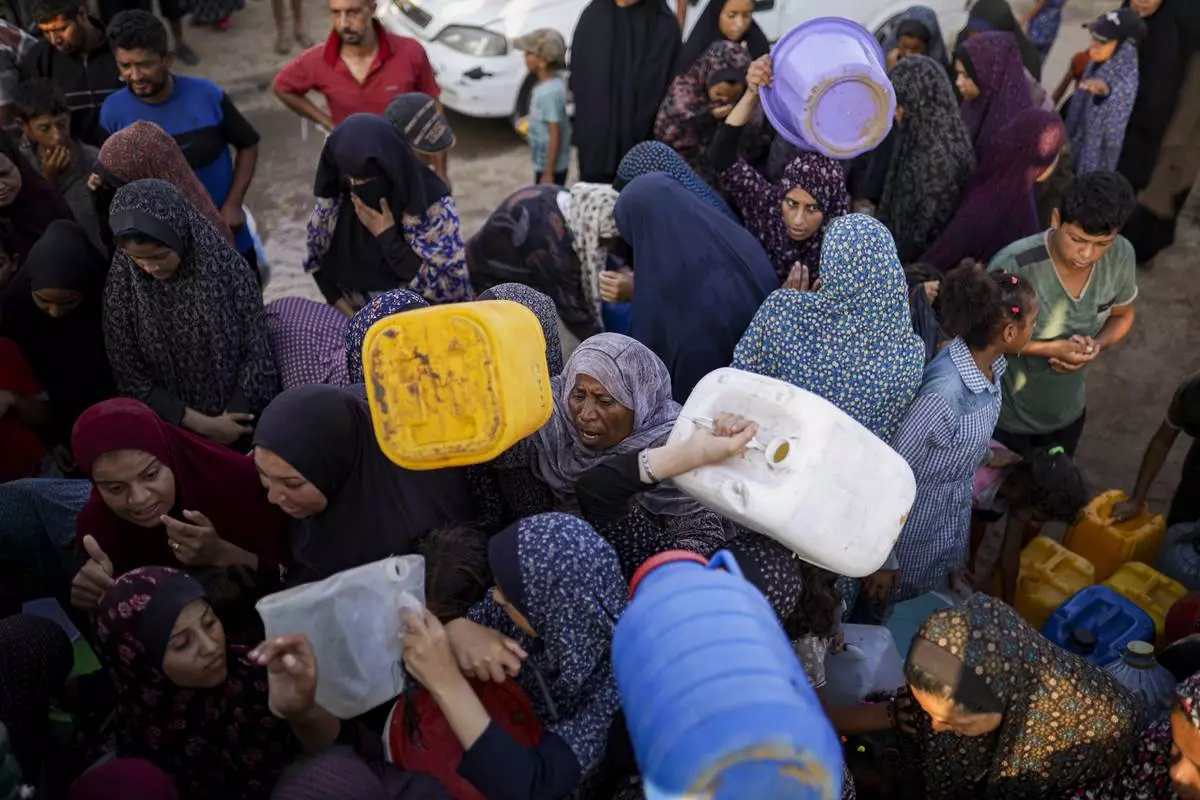
Palestinians displaced by the Israeli bombardment of the Gaza Strip queue for water at a makeshift tent camp in the southern town of Khan Younis, Monday, July 1, 2024. (AP Photo/Jehad Alshrafi)
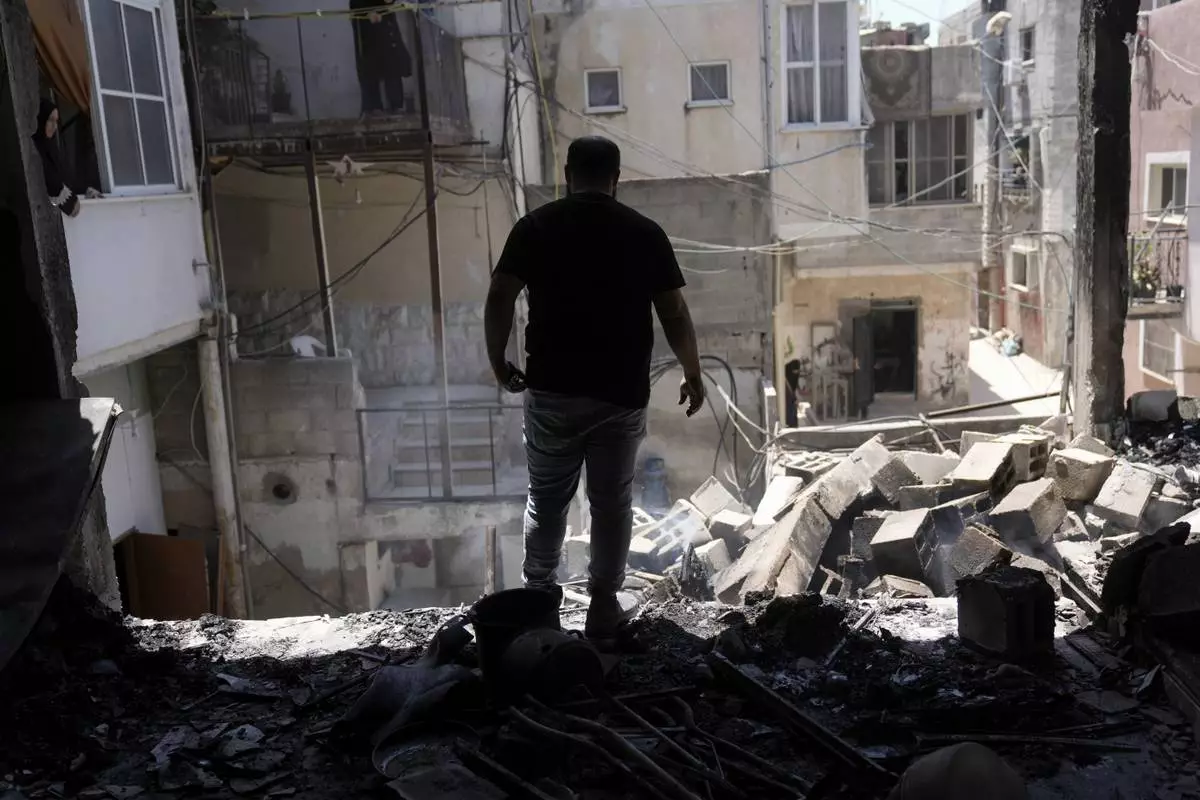
Palestinians inspect the destruction following an Israeli operation in Nur Shams refugee camp, near the West Bank town of Tulkarem, Monday, July 1, 2024. Palestinian health officials say a woman and a teenager were shot and killed, and four people were wounded by Israeli forces during a raid in the northern West Bank. (AP Photo/Majdi Mohammed)
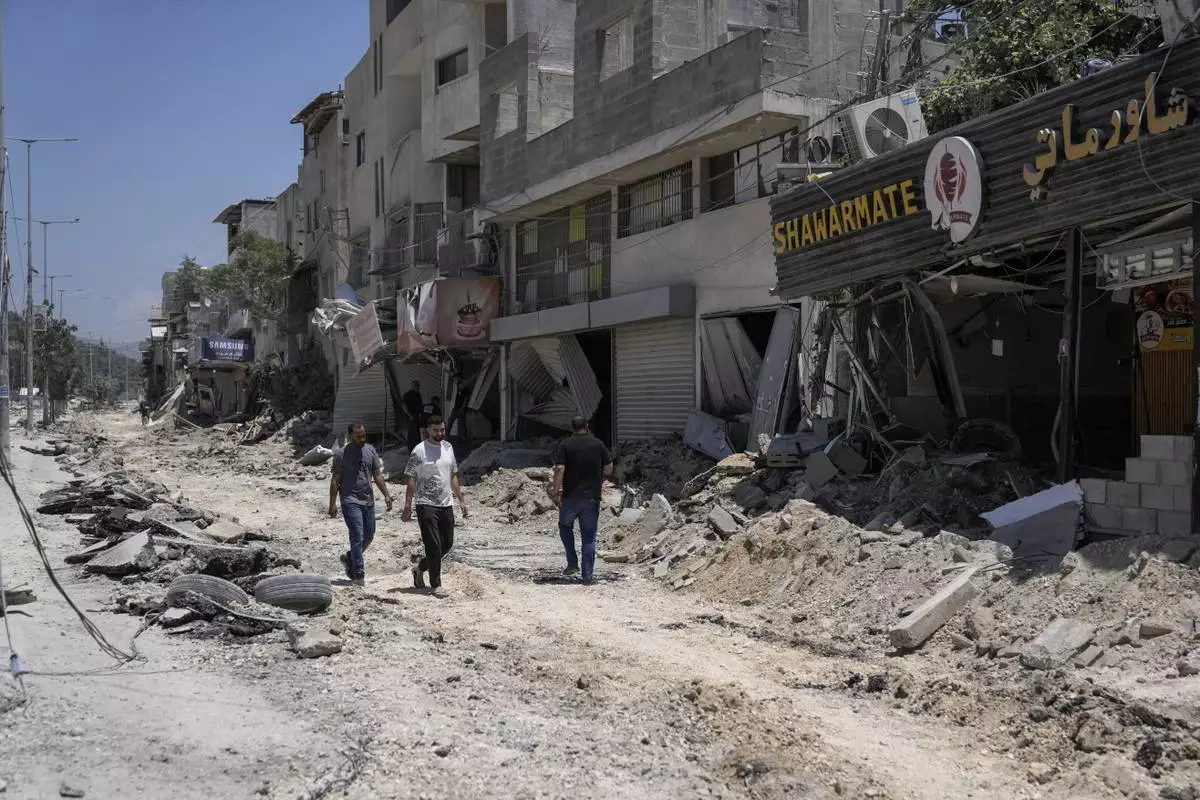
Palestinians walk along a damaged road following an Israeli operation in Nur Shams refugee camp, near the West Bank town of Tulkarem, Monday, July 1, 2024. Palestinian health officials say a woman and a teenager were shot and killed, and four people were wounded by Israeli forces during a raid in the northern West Bank. (AP Photo/Majdi Mohammed)
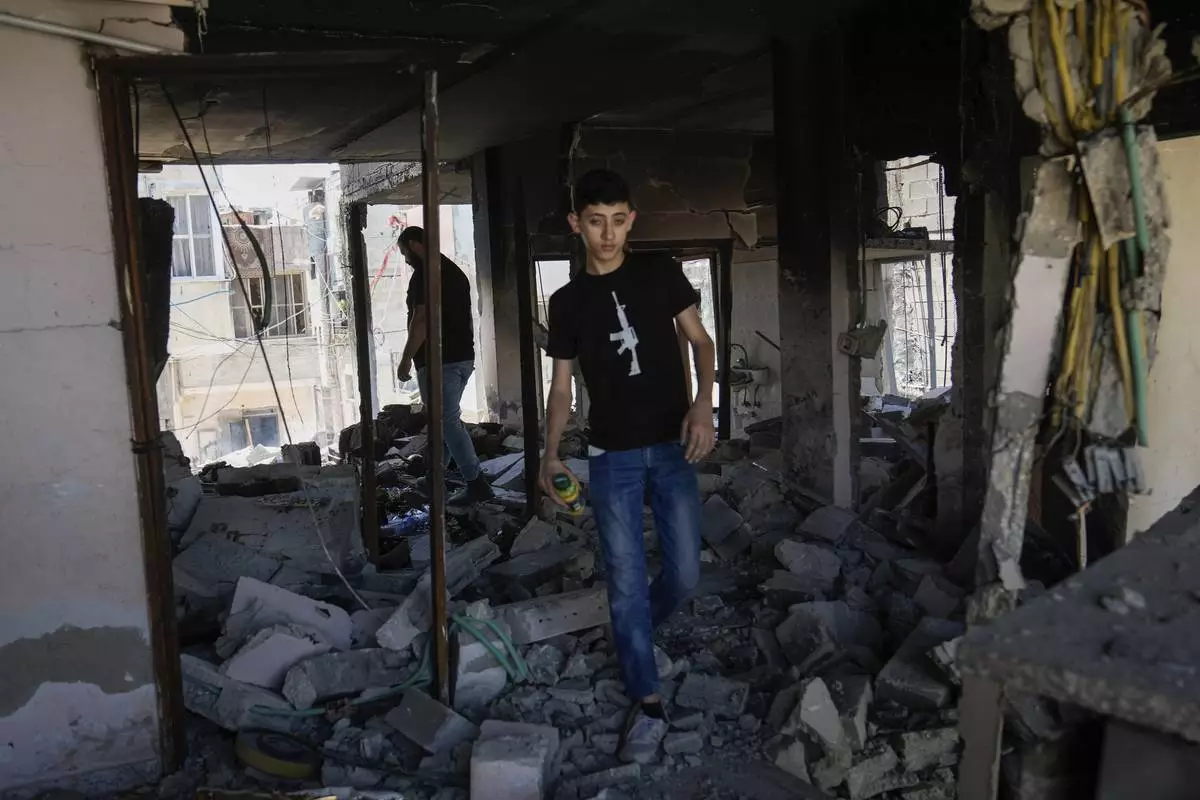
Palestinians inspect the destruction following an Israeli operation in Nur Shams refugee camp, near the West Bank town of Tulkarem, Monday, July 1, 2024. Palestinian health officials say a woman and a teenager were shot and killed, and four people were wounded by Israeli forces during a raid in the northern West Bank. (AP Photo/Majdi Mohammed)
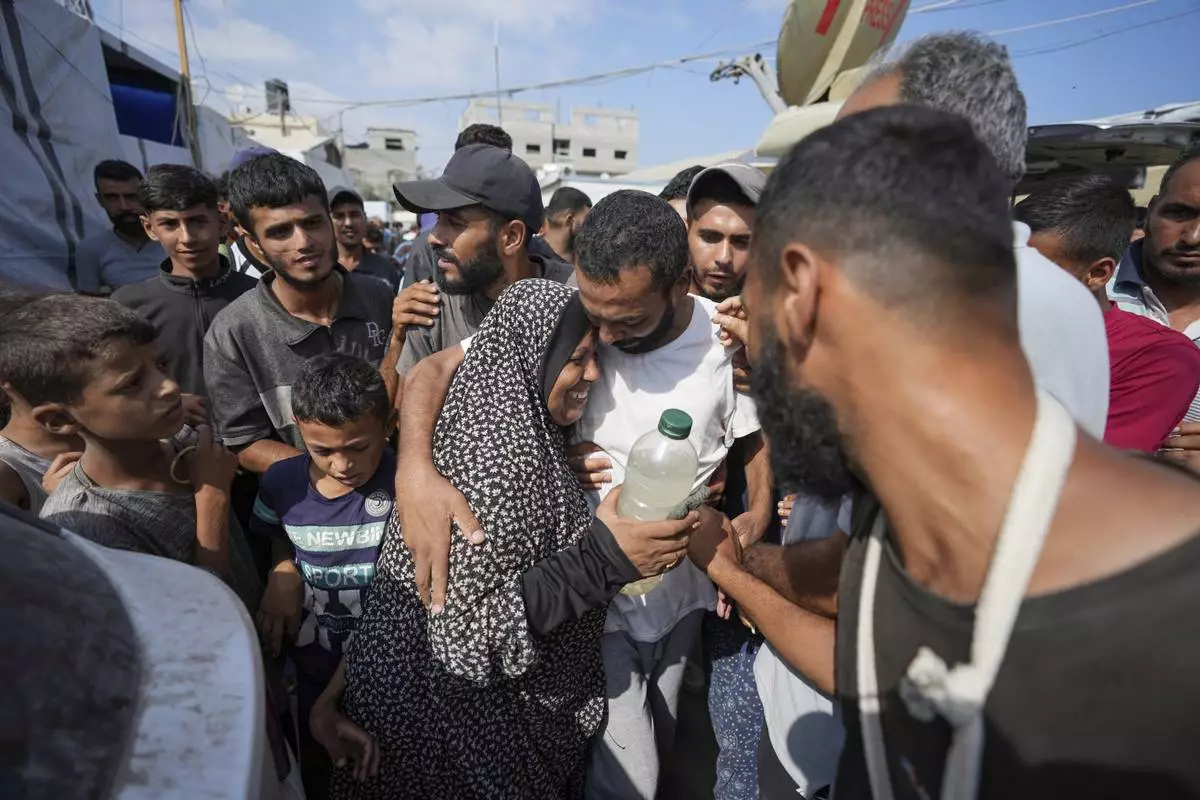
Palestinians who were arrested in the Gaza Strip by the Israeli military and released through the Kissufim crossing point are welcomed by relatives at a hospital in Deir al Balah, central Gaza Strip on Monday, July 1, 2024. (AP Photo/Abdel Kareem Hana)
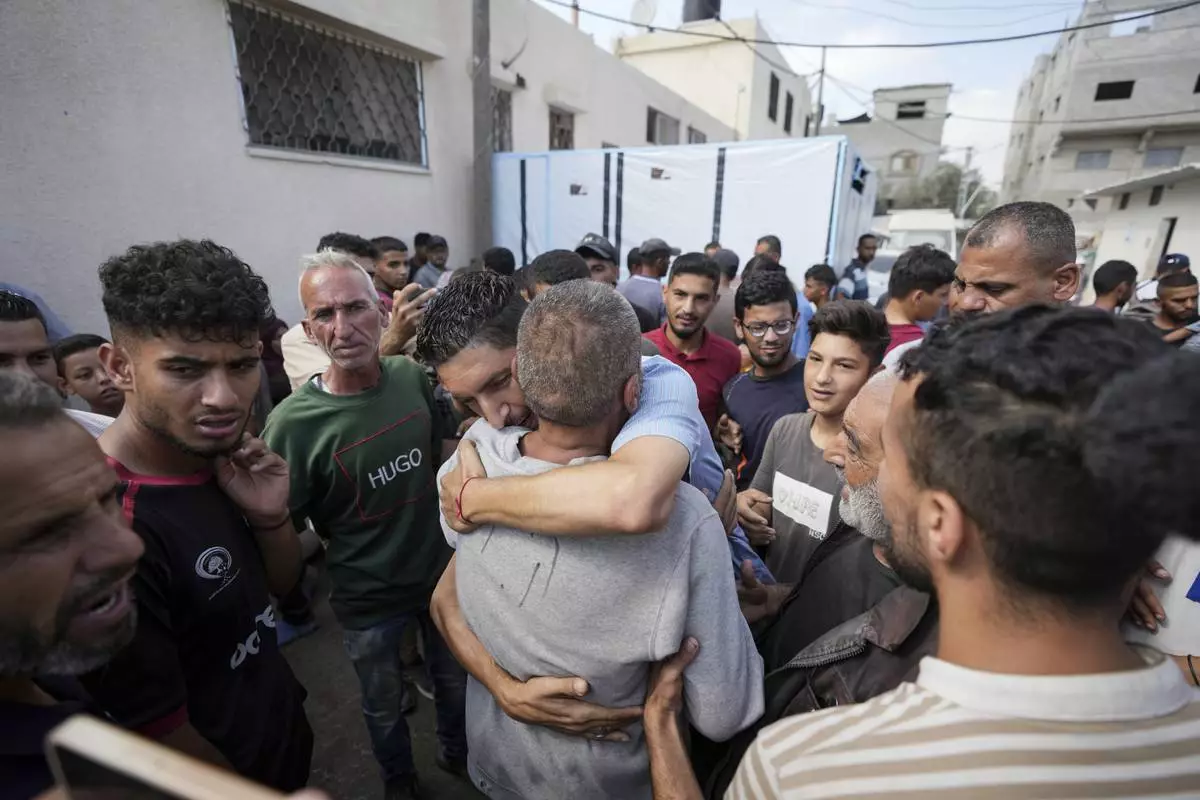
A Palestinian man, back to the camera, who was arrested in the Gaza Strip by the Israeli military and released through the Kissufim crossing point is welcomed by relatives at a hospital in Deir al Balah, central Gaza Strip on Monday, July 1, 2024. (AP Photo/Abdel Kareem Hana)
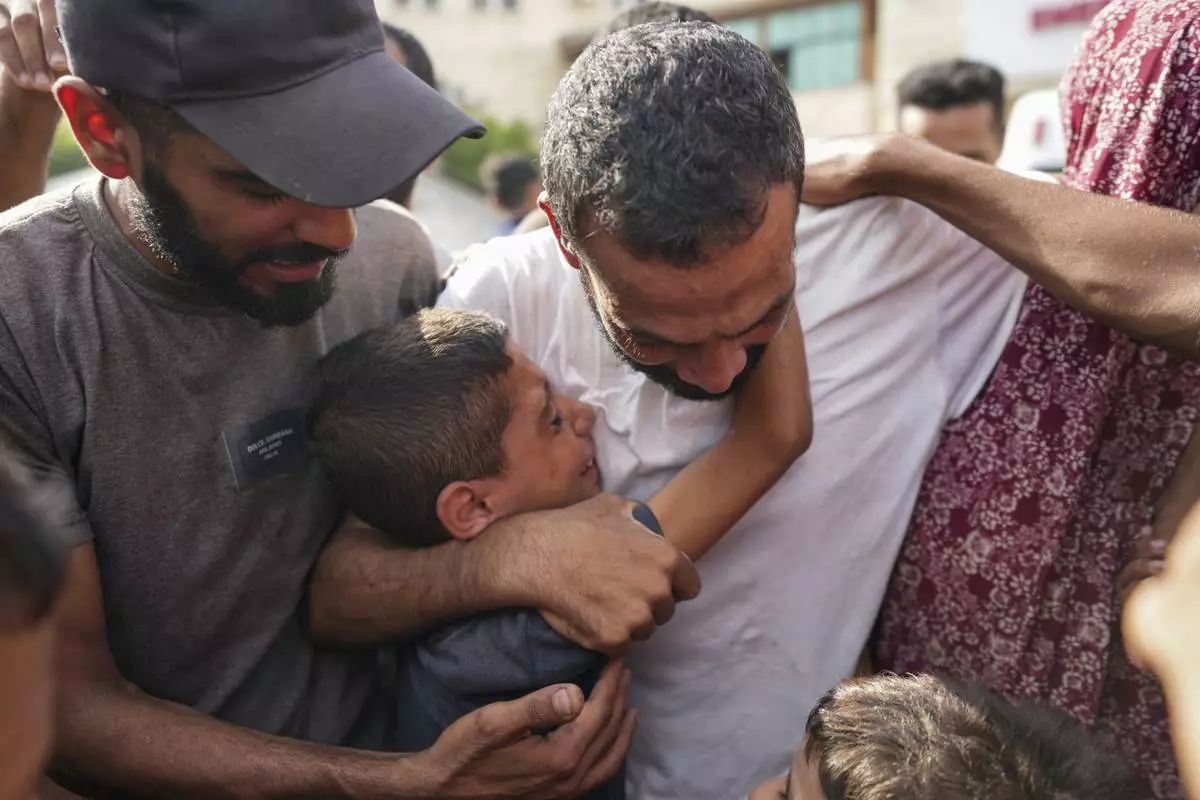
A Palestinian man, center, who was arrested in the Gaza Strip by the Israeli military and released through the Kissufim crossing point is welcomed by relatives at a hospital in Deir al Balah, central Gaza Strip on Monday, July 1, 2024. (AP Photo/Abdel Kareem Hana)
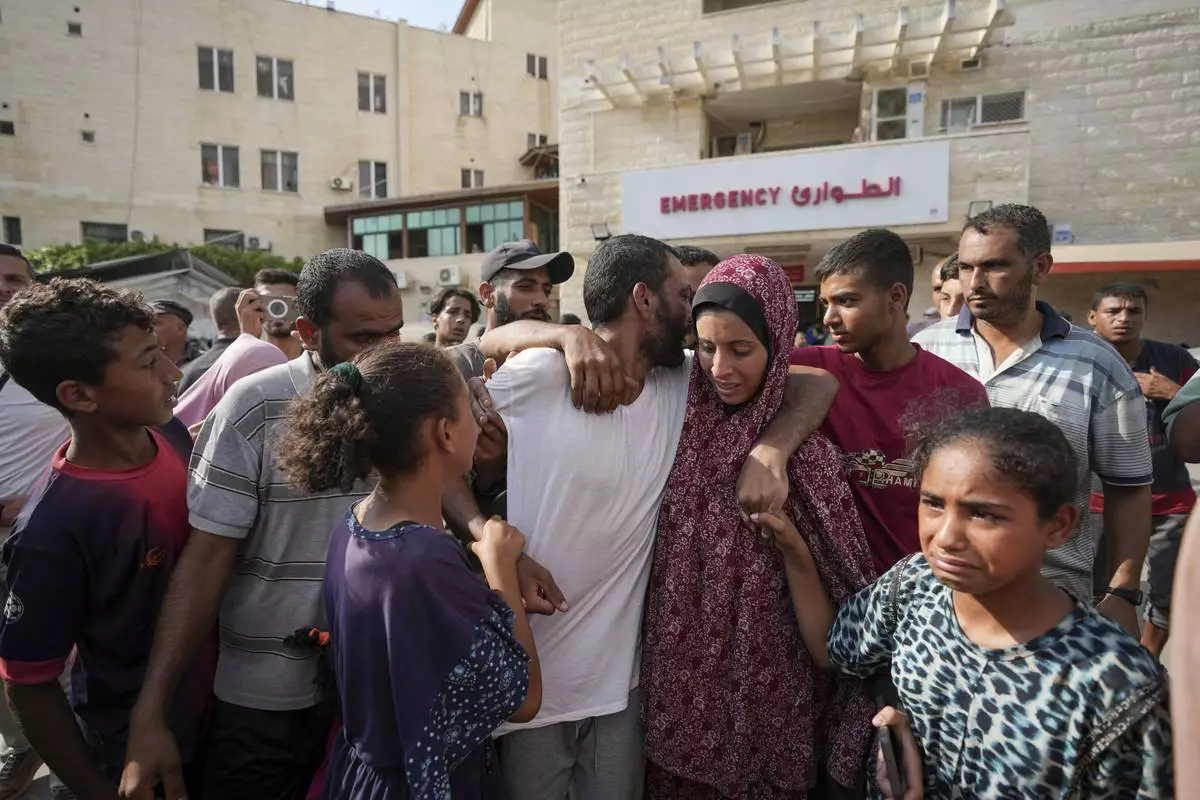
A Palestinian man, center, who was arrested in the Gaza Strip by the Israeli military and released through the Kissufim crossing point is welcomed by relatives at a hospital in Deir al Balah, central Gaza Strip on Monday, July 1, 2024. (AP Photo/Abdel Kareem Hana)
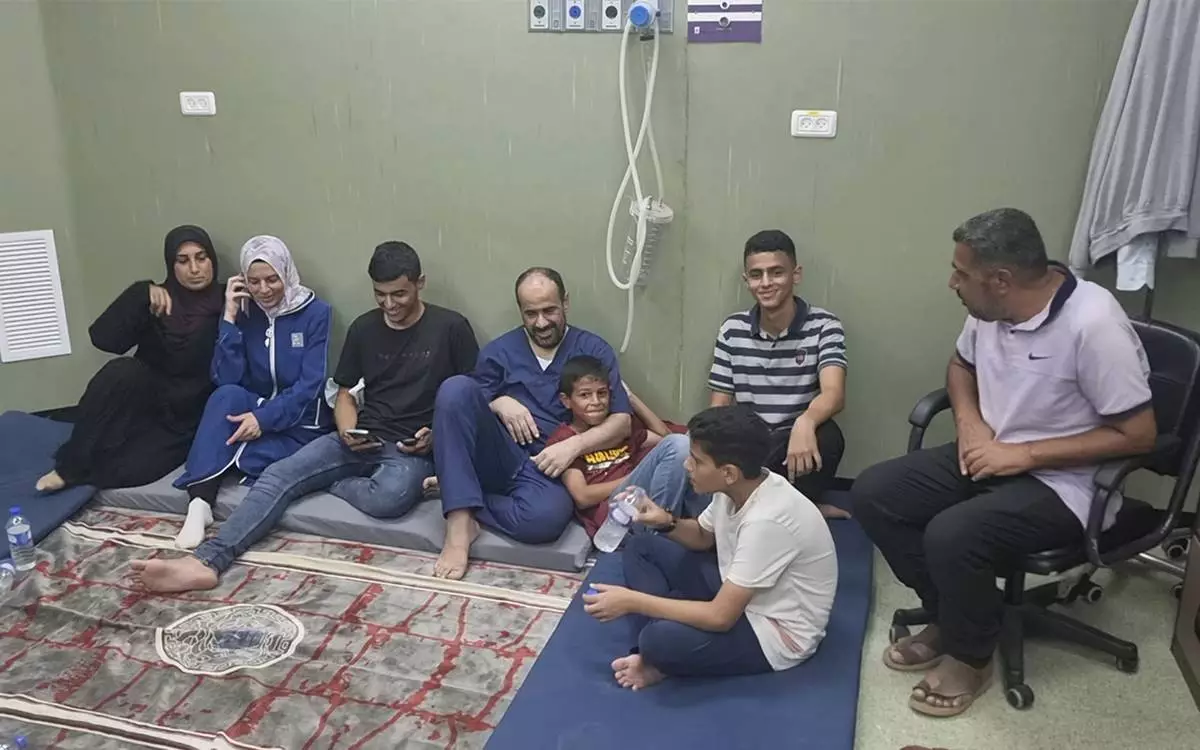
This video grab shows Mohammed Abu Selmia, center, the director of Gaza's main hospital, who was detained by Israeli forces in November, sitting with his family after his release, along with other detainees, at a hospital in Khan Younis, Gaza Strip on Monday, July 1, 2024. Israel released the director of Gaza's main hospital on Monday after holding him for seven months without charge or trial over allegations the facility had been used as a Hamas command center. He said he and other detainees were held under harsh conditions and tortured. (AP Photo/Mohammad Jahjouh)
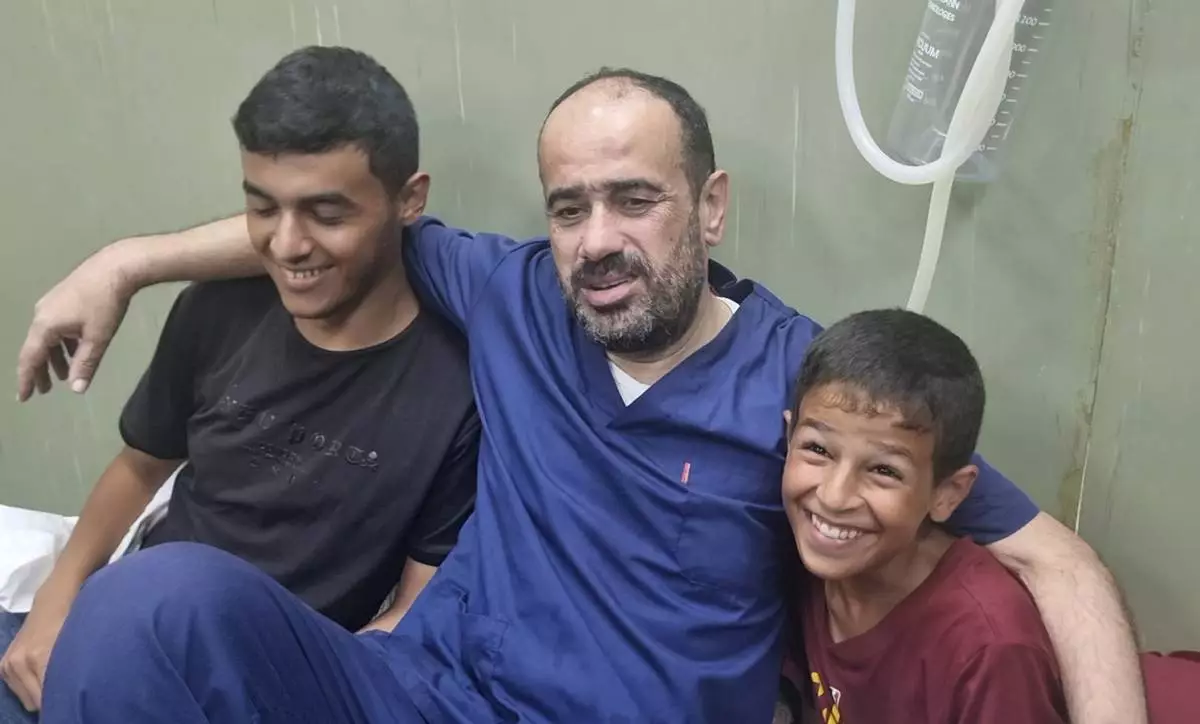
This video grab shows Mohammed Abu Selmia, the director of Gaza's main hospital, who was detained by Israeli forces in November, sitting with his family after his release, along with other detainees, at a hospital in Khan Younis, Gaza Strip on Monday, July 1, 2024. Israel released the director of Gaza's main hospital on Monday after holding him for seven months without charge or trial over allegations the facility had been used as a Hamas command center. He said he and other detainees were held under harsh conditions and tortured. (AP Photo/Mohammad Jahjouh)
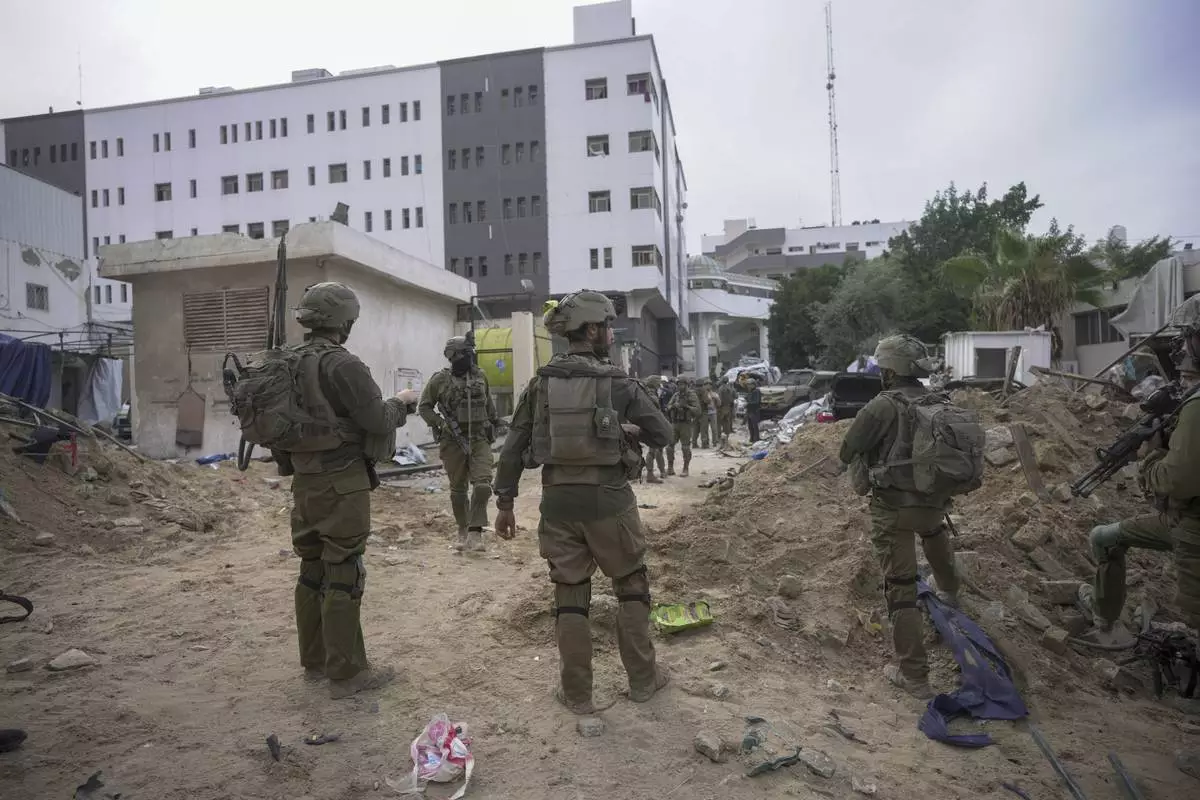
FILE - Israeli soldiers stand outside Shifa Hospital in Gaza City, Nov. 22, 2023. Israel released the director of Gaza's main hospital on Monday, seven months after the military raided the facility over allegations it was being used as a Hamas command center. (AP Photo/Victor R. Caivano, File)
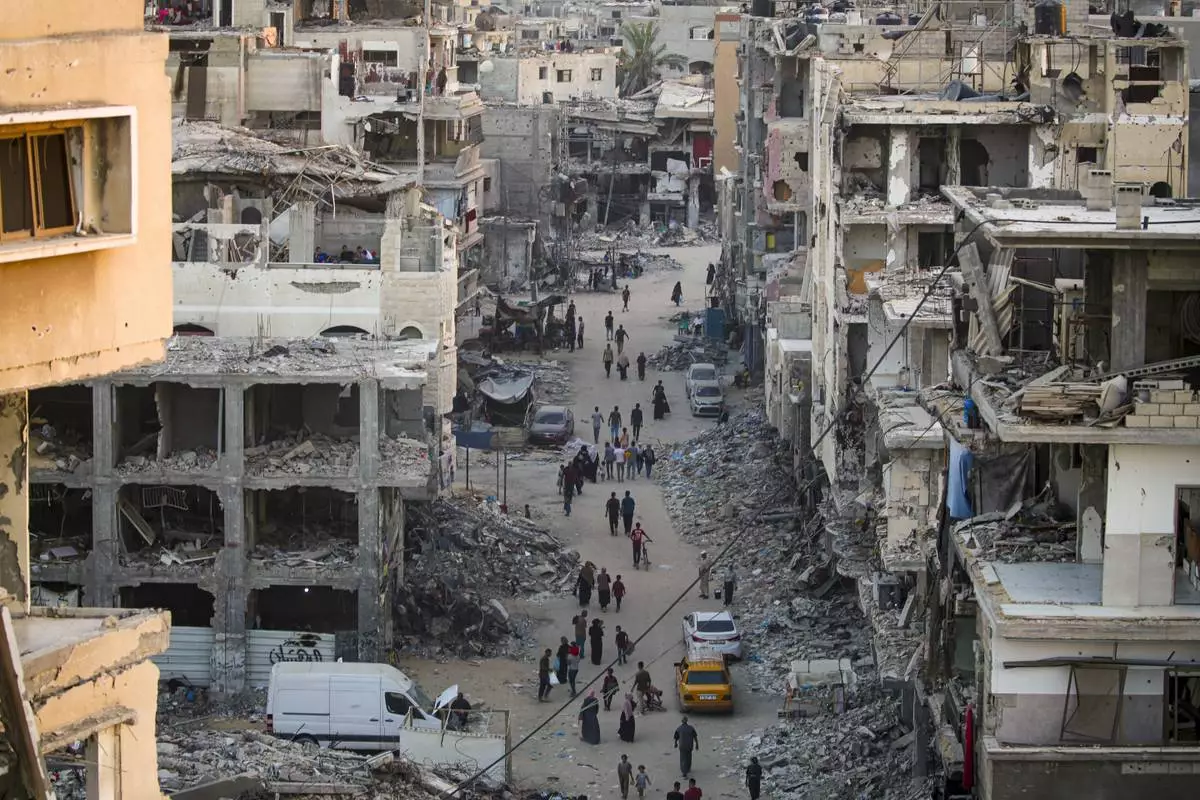
Palestinians displaced by the Israeli bombardment of the Gaza Strip walk through a street market in Khan Younis, southern Gaza Strip Saturday, June 29, 2024. (AP Photo/Jehad Alshrafi)
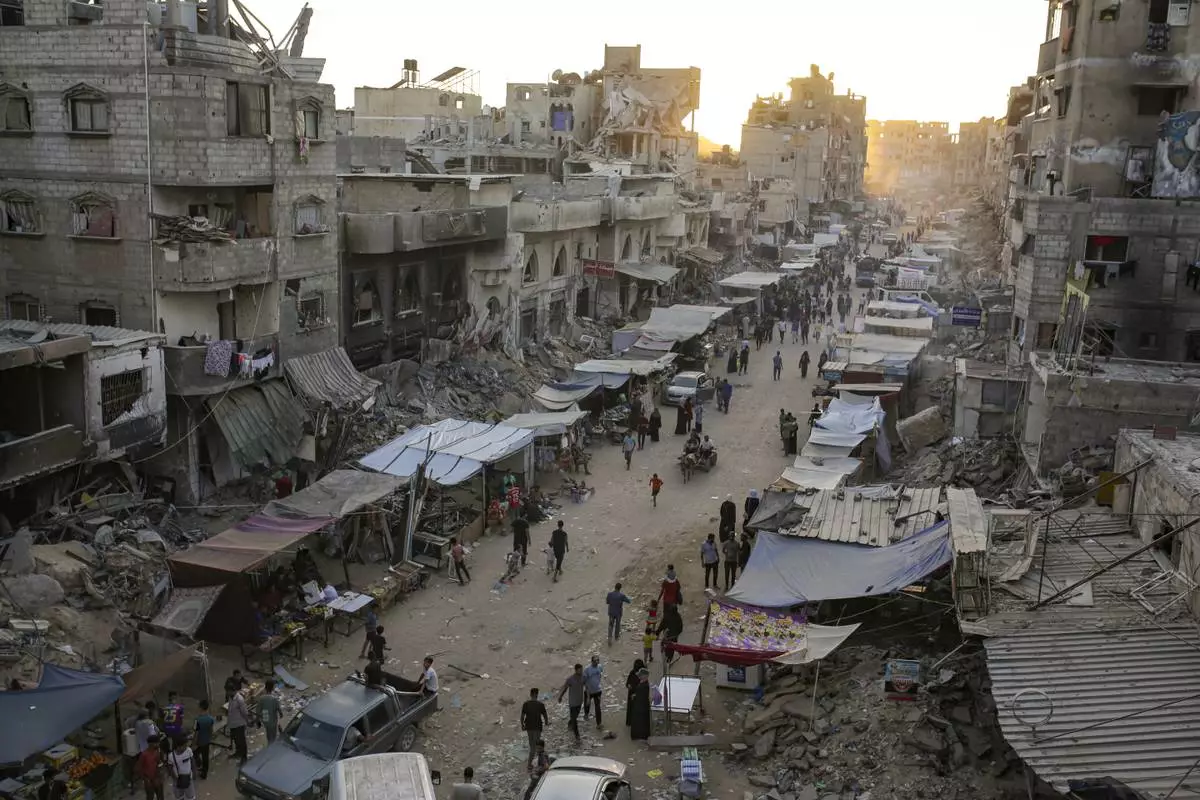
Palestinians displaced by the Israeli bombardment of the Gaza Strip walk through a street market in Khan Younis, southern Gaza Strip Saturday, June 29, 2024. (AP Photo/Jehad Alshrafi)
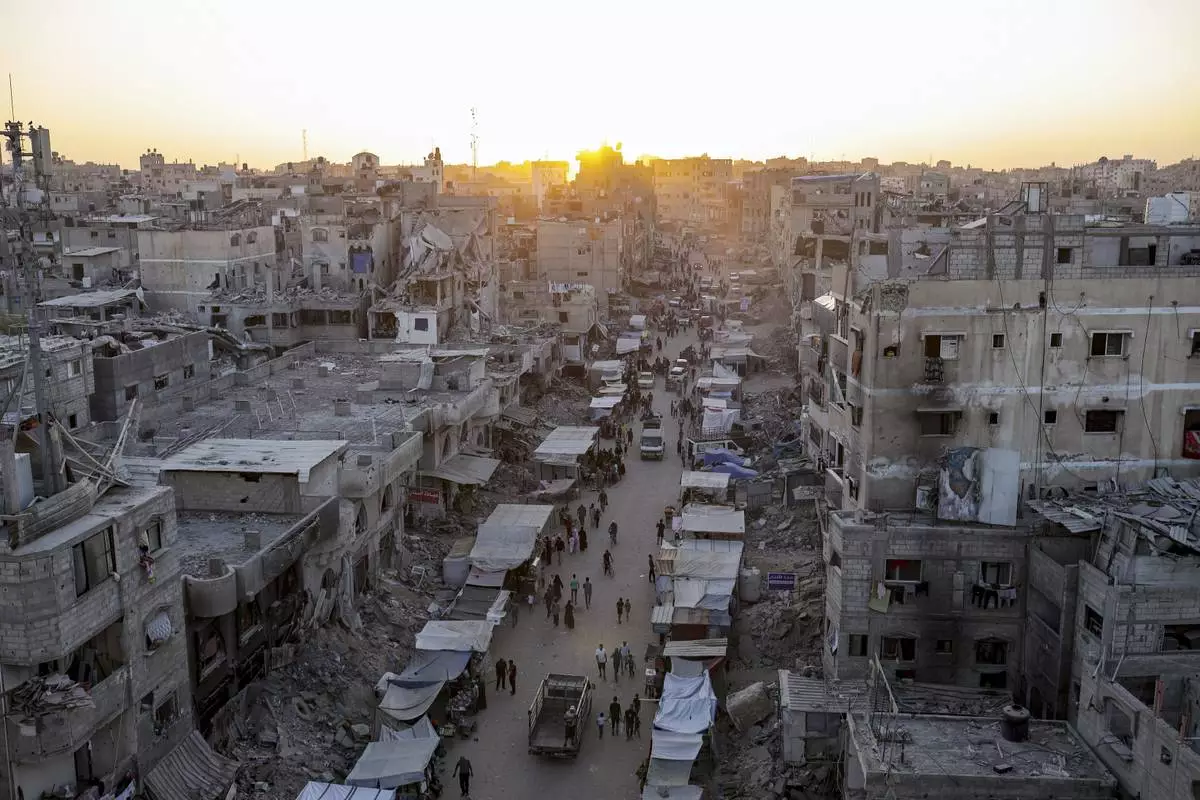
Palestinians displaced by the Israeli bombardment of the Gaza Strip walk through a street market in Khan Younis, southern Gaza Strip Saturday, June 29, 2024. (AP Photo/Jehad Alshrafi)
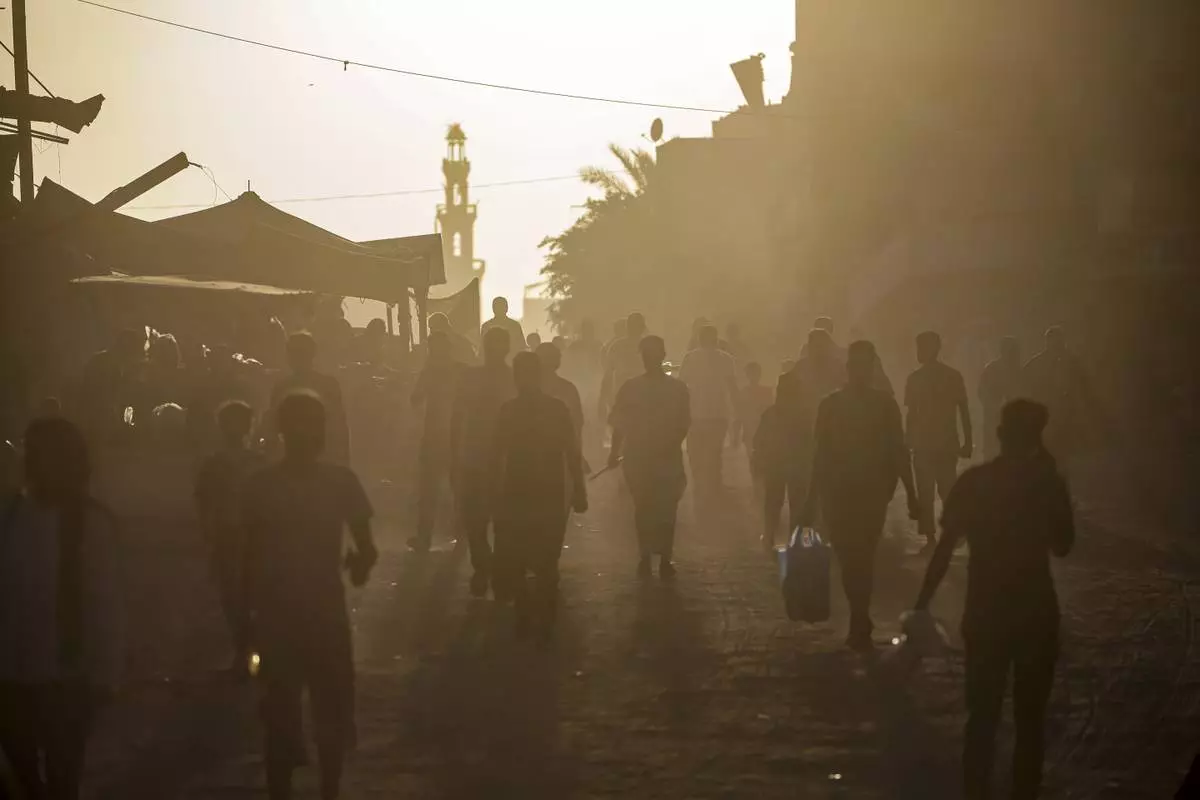
Palestinians displaced by the Israeli bombardment of the Gaza Strip walk through a street market in Khan Younis, southern Gaza Strip Saturday, June 29, 2024. (AP Photo/Jehad Alshrafi)
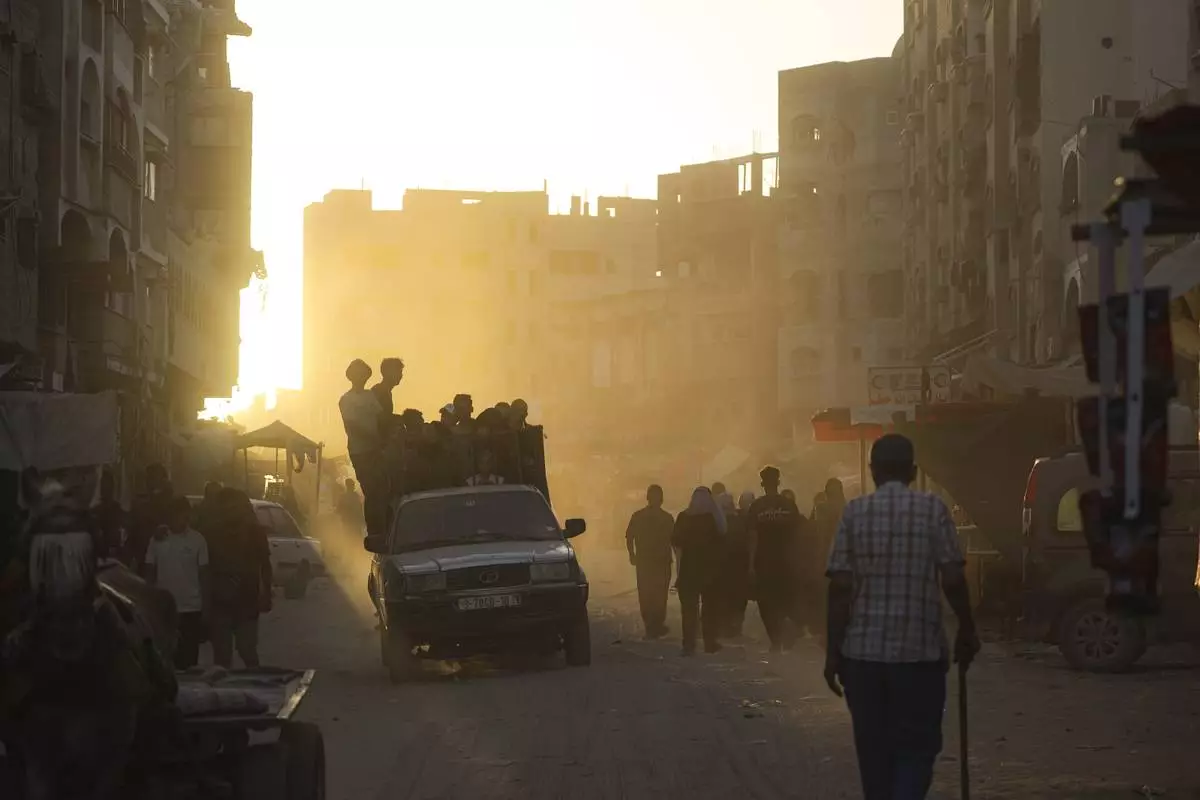
Palestinians displaced by the Israeli bombardment of the Gaza Strip walk through a street market in Khan Younis, southern Gaza Strip Saturday, June 29, 2024. (AP Photo/Jehad Alshrafi)









